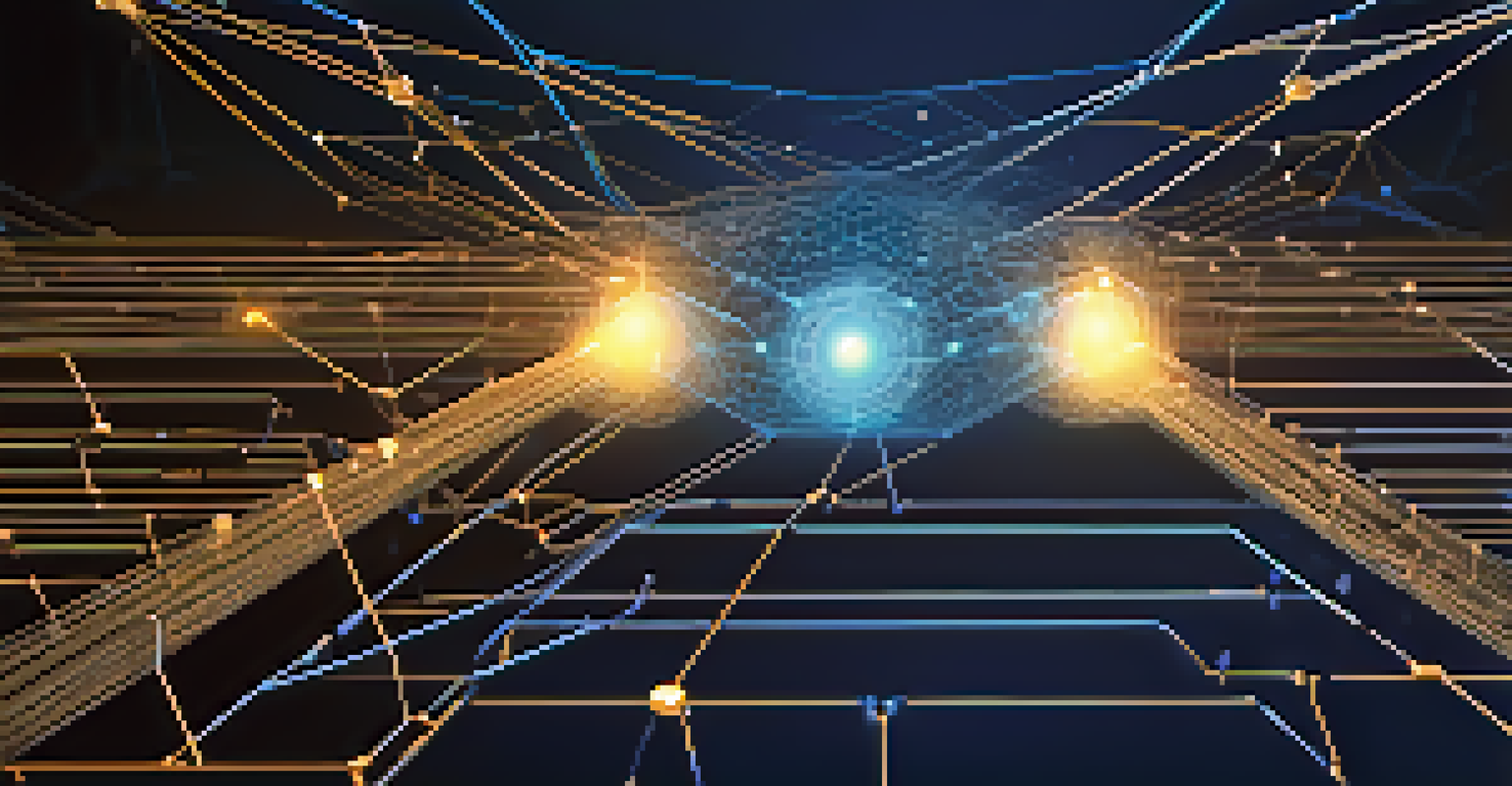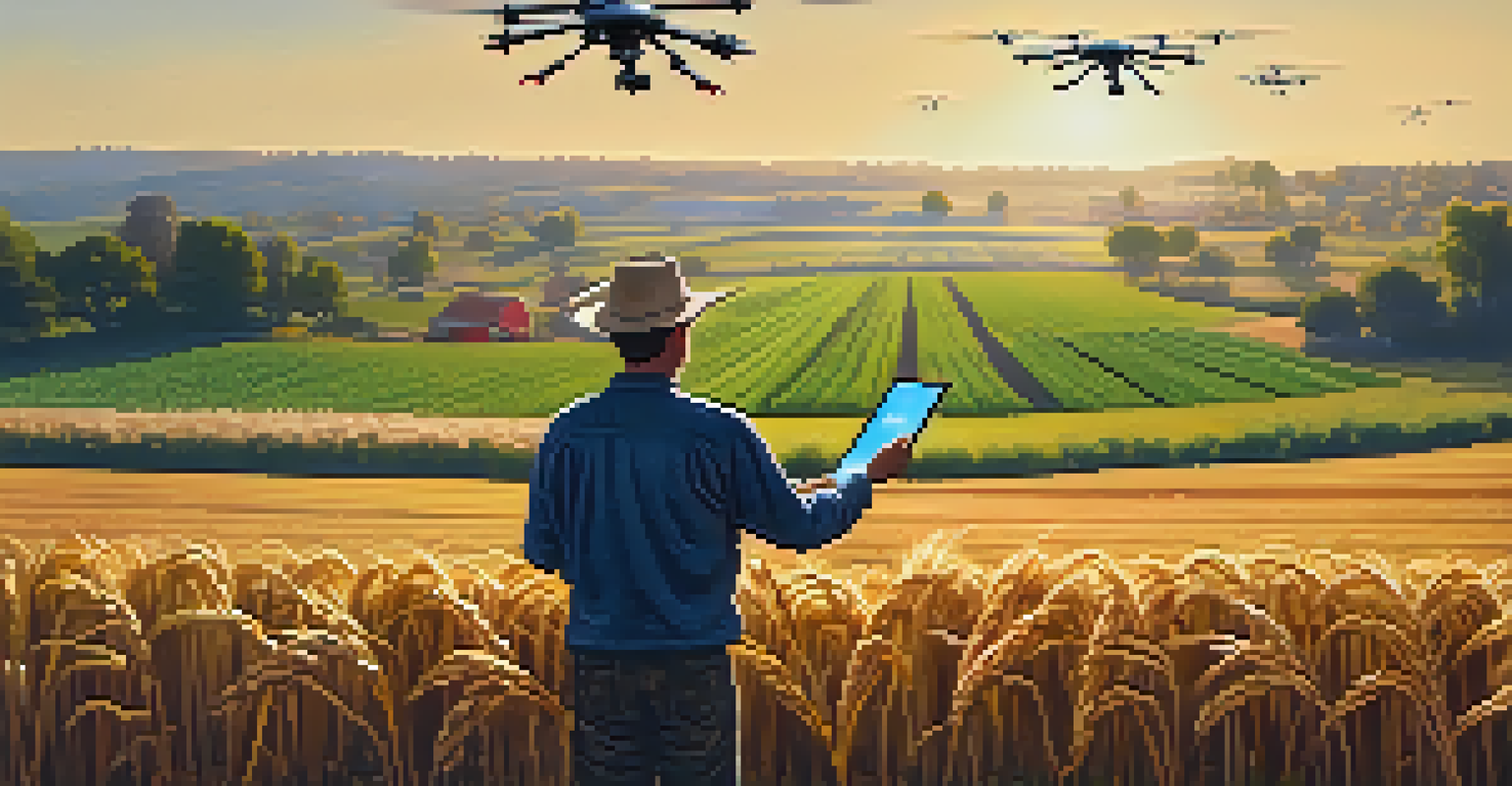Decentralized Oracles: Enhancing Trust in Blockchain Data

Understanding Decentralized Oracles in Blockchain
Decentralized oracles serve as bridges between blockchain networks and the real world. They provide a way for smart contracts to access external data without compromising security. Think of oracles as the messengers that deliver critical information, like market prices, weather conditions, or sports scores, to decentralized applications (dApps).
Data is the new oil, and oracles are the pumps that bring it into the blockchain ecosystem.
Unlike centralized oracles, which can be single points of failure, decentralized oracles distribute the data retrieval process among multiple nodes. This means that if one node fails or tries to provide false information, the other nodes can still ensure the integrity of the data. It’s a bit like having a committee that votes on the accuracy of information instead of relying on just one person’s word.
As blockchain technology continues to evolve, understanding decentralized oracles becomes crucial. They enable a new level of functionality for smart contracts, allowing them to interact with the outside world securely and reliably. This expansion opens doors for innovative applications across various sectors, from finance to supply chain management.
The Role of Oracles in Smart Contracts
Smart contracts are self-executing contracts with the terms of the agreement directly written into code. However, their effectiveness is limited without access to real-world data. This is where oracles come into play, providing the necessary information for smart contracts to function as intended.

For example, imagine a smart contract that pays out insurance based on weather data. A decentralized oracle can pull information from multiple reliable sources to determine if a certain weather condition, like a storm, occurred. This ensures that the contract executes fairly and accurately, reflecting real-world events.
Decentralized Oracles Enhance Data Integrity
These oracles act as reliable bridges, allowing smart contracts to access accurate real-world data while minimizing the risk of manipulation.
Without oracles, smart contracts would be isolated and unable to respond to changes in their environment. By integrating decentralized oracles, the potential for smart contracts expands significantly, enabling them to automate complex processes that require real-time data.
Enhancing Trust and Reliability in Data Sources
Trust is a fundamental aspect of any transaction, particularly in the blockchain space where transparency is key. Decentralized oracles enhance trust by aggregating data from multiple sources and validating it through consensus mechanisms. This collective approach minimizes the risk of data manipulation or fraud.
In a decentralized world, trust is built through consensus, and oracles are the gatekeepers of that trust.
Consider a situation where a decentralized finance (DeFi) platform needs accurate price feeds for various cryptocurrencies. By employing multiple oracles that source data from different exchanges, the platform can ensure that it receives a reliable average price. This not only protects users but also builds confidence in the platform’s operations.
The use of decentralized oracles creates a more resilient ecosystem, where users can trust that the data they rely on is accurate and tamper-proof. This level of reliability is essential for the long-term success and adoption of blockchain technologies.
Real-World Applications of Decentralized Oracles
Decentralized oracles have found applications across various industries, showcasing their versatility and importance. In finance, they are crucial for DeFi protocols, ensuring accurate price feeds and facilitating automated trading. They also play a role in insurance, where they verify claims based on real-world events.
For instance, Chainlink, a prominent decentralized oracle network, is already being utilized by various platforms to provide reliable data. Projects like Aave and Synthetix depend on Chainlink oracles to manage their lending and synthetic asset trading, respectively. This demonstrates how decentralized oracles are essential for the functionality of modern financial products.
Smart Contracts Depend on Real-World Data
Decentralized oracles provide the essential data needed for smart contracts to execute accurately, enabling functionalities like automated insurance payouts.
Moreover, their use extends to supply chain management, where oracles can verify the conditions of goods throughout their journey. This ensures that businesses and consumers alike can trust the authenticity and quality of products, further emphasizing the transformative potential of decentralized oracles.
Challenges Facing Decentralized Oracles
While decentralized oracles offer many benefits, they also face significant challenges. One major issue is the potential for data discrepancies among different sources. If oracles pull data from unreliable or conflicting sources, it can lead to erroneous outcomes in smart contracts.
Additionally, the complexity of implementing decentralized oracles can be daunting for developers. They must ensure that the oracles they choose are trustworthy and capable of maintaining high levels of security and performance. This requires thorough research and understanding of the oracle networks available.
Furthermore, as more projects integrate decentralized oracles, the competition for reliable data sources increases. This may lead to higher costs for accessing data and necessitates a balanced approach to ensure that the benefits outweigh the challenges.
Future Trends for Decentralized Oracles
The future of decentralized oracles looks promising, with rapid advancements on the horizon. Innovations in consensus mechanisms and data aggregation techniques are expected to enhance their reliability and efficiency. As technology evolves, we may see even more robust systems that can adapt to the changing landscape of blockchain applications.
Moreover, the increasing demand for secure and accurate data in various sectors will likely drive further adoption of decentralized oracles. As industries recognize their potential, we can expect to see new use cases emerging, particularly in areas like IoT (Internet of Things) and automated governance.
Future Trends Highlight Growing Adoption
As industries increasingly recognize their value, decentralized oracles are expected to see broader applications and advancements in technology.
Collaboration among different oracle networks may also become more prevalent, leading to a more interconnected ecosystem. This could provide users with access to a broader range of data sources, ultimately enhancing the overall reliability and functionality of decentralized applications.
Conclusion: The Essential Role of Decentralized Oracles
In conclusion, decentralized oracles play a crucial role in enhancing the trustworthiness and functionality of blockchain systems. By providing reliable access to real-world data, they empower smart contracts to operate effectively across various industries. This not only increases user confidence but also opens new possibilities for innovation.
As we move forward, the integration of decentralized oracles will likely become a standard practice in the blockchain space. Their ability to ensure data accuracy and mitigate risks will be essential for the success of numerous applications, particularly in finance and supply chain management.

Ultimately, embracing decentralized oracles is not just about improving technology; it’s about fostering a more transparent and trustworthy digital ecosystem, paving the way for a future where blockchain can fulfill its potential.